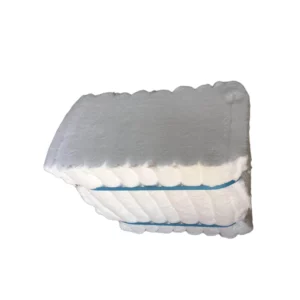Ceramic fiber board is a type of insulation material that is made from ceramic fibers and binders. It is a lightweight, low-density material that has excellent thermal insulation properties and high-temperature resistance.
Here are some key features and applications of ceramic fiber board:
Features:
High-temperature resistance: Ceramic fiber board can withstand high temperatures of up to 2600°F (1425°C).
Low thermal conductivity: Ceramic fiber board has a low thermal conductivity, which makes it an effective insulating material.
Chemical resistance: Ceramic fiber board is resistant to many chemicals and can be used in corrosive environments.
Lightweight: Ceramic fiber board is lightweight and easy to handle and install.
Applications:
Furnace linings: Ceramic fiber board is commonly used as a lining material in high-temperature furnaces, kilns, and ovens.
Heat shields: Ceramic fiber board can be used as a heat shield in industrial applications to protect equipment and personnel from heat radiation.
Insulation: Ceramic fiber board is an effective insulation material and can be used in a variety of applications, such as in power generation, petrochemical, ceramic fiber board suppliers and steel industries.
Fire protection: Ceramic fiber board can be used as a fire protection material in buildings and other structures.
It’s important to note that ceramic fiber board can be a respiratory hazard if the fibers are inhaled. Proper protective equipment should be used when handling and installing ceramic fiber board to prevent inhalation of the fibers. It’s also important to follow the manufacturer’s instructions for proper installation and use of the material.
Proper protective equipment should be worn when handling ceramic fiber board to prevent inhalation of the fibers.
Here are some recommendations for the appropriate protective equipment:
Respirator: A respirator with a high-efficiency particulate air (HEPA) filter should be worn to prevent inhalation of the ceramic fibers. The respirator should be chosen based on the level of exposure and the manufacturer’s recommendations.
Gloves: Gloves should be worn to protect the hands from the sharp edges of the ceramic fiber board.
Protective clothing: Protective clothing, such as a long-sleeved shirt and pants, should be worn to cover the skin and prevent contact with the ceramic fibers.
Eye protection: Safety glasses or goggles should be worn to protect the eyes from airborne fibers.
Dust mask: A dust mask can also be worn as an additional layer of protection to prevent inhalation of the fibers.
It’s important to follow the manufacturer’s instructions for handling and installing ceramic fiber board to ensure proper use and to minimize health risks. In addition, proper disposal procedures should be followed for any waste or excess material to prevent environmental contamination.
